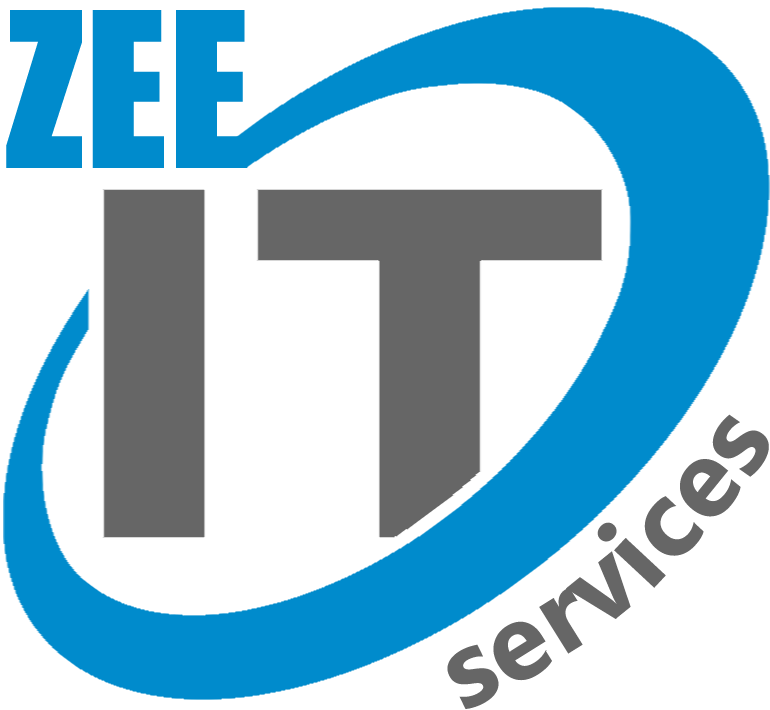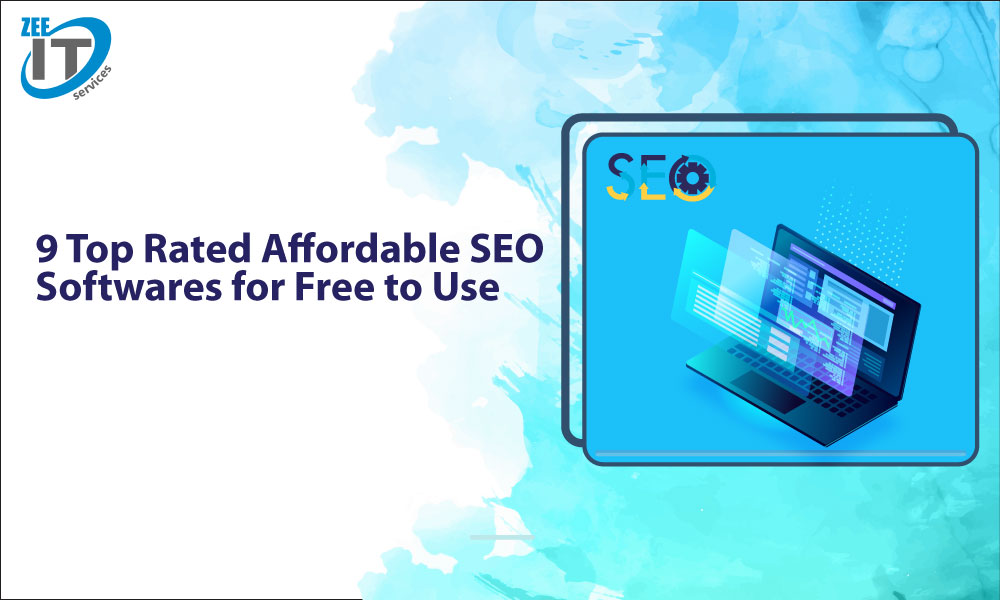
Feb 16, 2024 | Blogs
Search engine optimization (SEO) is considered as a ladder for online visibility and success. Businesses of all sizes are constantly seeking affordable yet effective SEO softwares to enhance their online presence, drive organic traffic, and ultimately boost conversions. As experienced in the industry, we understand the importance of taking the right tools to achieve these goals without having money. That’s why we take this comprehensive list of the top 9 affordable SEO software that you can utilize to boost your online strategy. So let’s start it!
What factors make the best SEO tool?
It might be challenging to pinpoint exactly what makes SEO tools exceptional because they can be categorized into several groups. I looked over hundreds of items and narrowed down a set of quality standards that applied to every area in order to grade them as impartially as possible.
Functionality focused on search engines:
Every tool has to provide features related to some aspect of search engine optimization. Additionally, By focusing on a task like competition analysis, content ideation, website performance reporting, on-page performance debugging, or keyword analysis, they should fall into one of the aforementioned categories.
Value of tool:
How well does the cost reflect the product’s quality? Just as comprehensive tools should have vast feature sets and premium tools in general should be more helpful than free choices, products with specialized use cases should be effective enough to warrant subscriptions for users of more complete tools.
User experience:
How simple is it to use, integrate, and learn how to utilize the tool? Users should not have to turn to less functioning, but more familiar tools in order to reliably access any feature in advanced tools due to a low learning curve.
Integrations:
Integration is essential for SEO tools since digital marketers frequently employ a variety of software programs. Moreover, these technologies ought to be easily integrated by users into popular platforms for relevant tasks including customer relationship management, scheduling, reporting, and meetings.
9 top-rated Affordable SEO softwares
SEMrush
Semrush and SEO are nearly interchangeable. The insights and features of this rank tracker are strong and expandable enough to meet almost any business’s or Small and Medium sized businesses performance monitoring requirements.
Semrush is quite versatile, but its main uses are for comprehensive keyword research, SERP analysis, and page ranking measures. It provides a comprehensive summary of a tracked domain’s performance in terms of metrics like higher domain authority, backlinks, traffic, organic keywords, and average time on site through its extremely extensive dashboard with customisable widgets. Additionally, these have specific widgets where you may go more into them, or you can use them to create reports.
Features:
- Keyword Research: Gain valuable insights into high-ranking keywords relevant to your niche.
- Competitive Analysis: Analyze competitor strategies and identify opportunities for improvement.
- Site Audit: Detects and fixes technical SEO issues to improve site performance.
- Backlink Analysis: Monitor backlink profiles and identify quality link-building opportunities.
Ahrefs
If you don’t find Semrush to be compatible with your needs then you can turn to Ahref.
Ahrefs is a premium rank tracker that offers somewhat less expensive membership choices, and it occupies a very comparable niche in the SEO tools ecosystem. You can use it to analyze your competitors.
Ahrefs shares many of Semrush’s characteristics as a rank tracker. Moreover, you can conduct site audits, track the evolution of a particular website or domain’s position for keywords, and use customizable charts to view past ranking data. Intriguing extra features include Web Explorer, which displays ranking data for web pages on the internet for specific keywords.
Features:
- Site Explorer: Gain in-depth insights into your competitors’ backlink profiles and organic search traffic.
- Keyword Explorer: Discover thousands of keyword ideas and analyze their search volumes and difficulty.
- Content Explorer: Find popular content in your niche and uncover link-building opportunities.
- Rank Tracker: Monitor your search engine rankings and track progress over time.
Moz Pro:
Moz pro is another important tool. You can use your time wisely by implementing the highest priority recommendations to enhance page SEO using Moz Pro. Moreover, with personalized recommendations based on other sites that rank for your keywords, you can decide what content to write next.
Features:
- Keyword Explorer: Discover new keywords and prioritize them based on difficulty and opportunity.
- Site Crawl: Identify and resolve technical issues that may impact your site’s SEO performance.
- Link Explorer: Explore backlink opportunities and monitor your link profile.
- On-Page Optimization: Optimize your content for maximum search visibility.
Google Search Console
Google Search Console, formerly known as Google Webmaster Tools, is a free online analytics tool dedicated entirely to the way your website performs in Google searches. Moreover, it allows you to submit XML sitemaps and specific URLs for rating, delve further into your data, and discover click-through rates and the keywords you rank for.
Features:
- Performance Tracking: Monitor your site’s performance in Google search results and identify areas for improvement.
- Index Coverage: Ensure that Google can crawl and index your site’s pages effectively.
- URL Inspection: Debug and troubleshoot individual URLs to improve their visibility in search results.
- Mobile Usability: Ensure that your site is mobile-friendly to improve user experience and search rankings.
Serpstat
Oleg Salamaha invented the SEO softwares suite Serpstat. From being a tool for researching keywords, it has gradually developed into a “growth hacking tool” with capabilities for PPC, technical SEO, link building, and more.
Features:
- Keyword Research: Discover profitable keywords and track their search volumes and trends.
- Competitor Analysis: Analyze competitor strategies and identify areas where you can gain a competitive advantage.
- Site Audit: Identify and fix technical issues that may be holding back your site’s SEO performance.
- Backlink Analysis: Monitor your backlink profile and identify opportunities for improvement.
Rank Math
RankMath is the “new” tool on the WordPress SEO plugin block, yet some SEO experts are taking to it like a cult. It has several features like built-in redirection, which eliminates the need to install other plugins or pay for updates, and it is a fully functional tool.
Features:
- On-Page SEO: Optimize your content for maximum search visibility with built-in suggestions and analysis.
- XML Sitemap: Generate and submit XML sitemaps to search engines to ensure all your pages are indexed.
- 404 Monitor: Detects and fixes 404 errors to improve user experience and search rankings.
- Rich Snippets Integration: Enhance your search listings with rich snippets to increase click-through rates.
SE Ranking
SE Ranking is a powerful SEO toolbox that works well for in-house teams and small to medium-sized firms. Specialized and advanced statistics help SEO experts in creating and implementing winning SEO campaigns.
Features:
- Keyword Tracking: Monitor your keyword rankings and track progress over time.
- Competitor Analysis: Analyze competitor strategies and identify areas for improvement.
- Backlink Explorer: Explore your backlink profile and identify opportunities for link-building.
- Website Audit: Identify and fix technical issues that may be affecting your site’s SEO performance.
Ubersuggest
Ubersuggest is a free application that suggests keywords based on a target term or URL that you specify. A free account allows you to do three searches per day; additional searches will need a paid membership. Ubersuggest will provide you with a lengthy list of potential keywords for your next blog post, products, and approaches to get more organic traffic.
Features:
- Keyword Research: Discover new keyword opportunities and analyze their search volumes and competition.
- Site Audit: Identify and fix technical issues that may be affecting your site’s SEO performance.
- Backlink Analysis: Monitor your backlink profile and identify opportunities for improvement.
- Content Ideas: Find popular content ideas in your niche and uncover opportunities for creating engaging content.
Screaming Frog SEO Spider
A free SEO tool called Screaming Frog SEO Spider scans your website for problems like broken links and other SEO problems that might lower user experience and, consequently, lower your rankings. For free, Screaming Frog will audit up to 500 URLs and identify the sites that require maintenance. Additional URLs can also be purchased.
Features:
- Website Crawling: Crawl your website to identify technical SEO issues that may be affecting your search rankings.
- URL Analysis: Analyze individual URLs to identify areas for improvement and optimization.
- XML Sitemap Generator: Generate XML sitemaps to ensure all your pages are crawled and indexed by search engines.
- Integration with Other Tools: Seamlessly integrate with other SEO tools for a more comprehensive analysis.
Frequently Asked Questions:
What are the benefits of using affordable SEO softwares for my business?
Using affordable SEO softwares offers several benefits. By optimizing your website for search engines, you can increase your online visibility and attract more organic traffic. In addition, by staying ahead of the competition with effective SEO strategies, you can gain a competitive advantage in your industry. Investing in affordable SEO softwares can lead to a higher return on investment (ROI) by driving more targeted traffic to your website and increasing conversions.
Can affordable SEO softwares help me improve my website’s search engine rankings?
Yes, affordable SEO softwares can help improve your website’s search engine rankings by providing valuable insights and tools to optimize your site for search engines. Moreover, features such as keyword research, site audit, and backlink analysis can help you identify areas for improvement and implement effective SEO strategies to boost your rankings.
How often should I use affordable SEO softwares to see results?
The frequency of using affordable SEO softwares depends on your specific business goals, website needs, and available resources. However, it’s recommended to use SEO softwares regularly to monitor your website’s performance, track progress, and make necessary adjustments to your SEO strategy. Consistent use of SEO software can help you achieve sustainable results and maintain a strong online presence over time.
Are there any limitations to using affordable SEO software?
While affordable SEO software offers many benefits, it’s essential to be aware of its limitations. Some affordable SEO software may have fewer features or limitations compared to premium options. Additionally, while SEO software can provide valuable insights and tools, achieving significant results requires ongoing effort, strategy, and optimization beyond just using the software.
Can I use multiple affordable SEO software solutions simultaneously?
Yes, you can use multiple affordable SEO software solutions simultaneously to complement each other’s features and capabilities. Using a combination of different tools can provide a more comprehensive approach to SEO and help you achieve better results. However, be mindful of overlapping features and ensure that the software solutions you choose integrate well with each other to streamline your workflow and maximize efficiency.

Dec 20, 2023 | Blogs
Search generative experience is a new way to search user’s queries instead of searching on different websites. Google uses AI models to answer the queries of different users. With the innovation of this tool, the strategies of SEO and marketing also changed. It gets more complicated for the websites to reach on the first page. Now you may ask how to rank your website in Google search generative experience. To maintain your top position in search engine rankings, website owners and various SEO analysts must become aware of this generating experience. Now let’s begin by providing a response to the query of how to rank in Google’s generative experience search engine.
What is search engine generative experience?
Google announced on May 10 2023 to release its limited beta version in its products with the integration of generative AI. This new version of searching queries with a new style is called the search generative experience.
The SGE uses generative AI, which is also used in chatgpt, to generate brief essay-style responses to user queries along with recommended sources for additional information, suggested questions to ask, as well as other features. This technology is currently in the experimental stage, but by early 2024, the general public should expect to embrace and use it.
Traditional search results won’t be eliminated or replaced by this search generative. Rather, the results from other websites will appear under the AI results.
All of the SERPs will appear as the user scrolls down, giving them additional alternatives to use the SGE or visit other websites. Now you can see how simple and adaptable Google makes it to enhance user experience.
Text and picture generation is now possible with SGE. In fact, you can type in a prompt just like you would in ChatGPT, and the result will appear directly on your search page.
Components of SGE
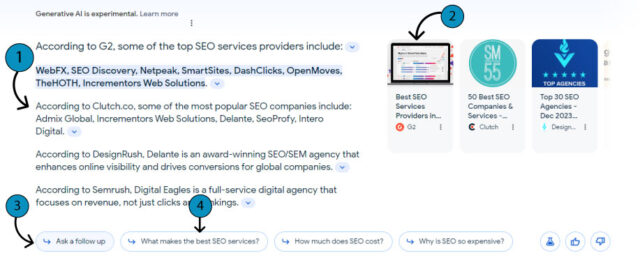
With the option of Search generative experience, you will see the following components:
- First of all, when you enter the query it will generate the response faster and more relevant.
- Then on the right side of SGE, it gives you the option of different relevant suggestions from different websites that can answer the exact query of users.
- Then below the SGE results “Ask a follow-up” will show you the option to ask the question related to your query. So it will give you an answer in the context of your query that you have entered.
- Then next to this, the most relevant question will arise that has more probability to have in your mind.
Now let’s discuss how these components of SGE provide benefits to your websites.
How can SGE components be beneficial for your websites?
Carousel Listings: A Gateway to Organic Traffic
The first and most obvious benefit of SGE is getting a desired position in the “carousel” links. The majority of organic traffic is likely to be directed to these carousel links, which are prominently shown when SGE answers load as we shown in the image above. Having your website displayed in this carousel is a direct route to increased visibility and traffic as more and more users turn to SGE for quick solutions.
Inclusion in SGE Dropdowns: Amplifying Your Reach
Being included in the SGE dropdowns is the second way to gain from SGE. Studies show that websites included in the individual drop-downs and those highlighted in the carousel have a powerful connection. Securing a spot in these dropdowns increases the visibility of your website, making it more relevant to the user’s search and extending your reach throughout the SGE ecosystem.
Rare Opportunities: Follow-Up Questions and Brand Associations
SGE offers a rare chance for companies to gain unexpected advantages even if it is less frequent. In some cases, SGE recommends asking follow-up questions that we have discussed above, including brand connections. Brands can influence SGE to view them as closely connected by using smart content marketing, creating unique opportunities for visibility.
Personalized Recommendations: A Tailored Approach
The last phase of SGE benefits is having your product or service suggested to consumers when they have relevant queries. The ability of SGE to suggest companies or goods in answer to particular questions demonstrates a customized strategy for user interaction. This customized suggestion engine may greatly increase brand recognition and trust among consumers looking for products that match yours.
What factors help you rank on Search generative experience?

Now that you have a deep understanding of search generative experience then move to our question of how to rank in Google Search generative experience. The way information is presented in search results has undergone a fundamental change with SGE, highlighting the necessity of making calculated adjustments to content creation and optimization.
Leveraging the E.E.A.T. Principles
Experience, Expertise, Authoritativeness, and Trustworthiness (E.E.A.T.) remain the highest priority of Google’s ranking algorithm. The importance of sharing high-quality content cannot be overstated. Craft website content and blogs that not only captivate your audience but also establish your brand as an authority within your niche so try to write on a topic that shows trust and credibility. Aligning with the E.E.A.T. principles is crucial, as Google seeks to feed engaging content into its AI system.
One thing that you always keep in mind is that I believe most people in the SEO business misunderstand the important part of authority included in Google’s Quality Rater Guidelines, considering it to imply just links. No, authority does not mean only the links and Google also makes it very clear in the SQR Guidelines that authority is a little broader than that links.
Deepening Keyword Research
It’s not enough now for SEO to match your keywords with the search query. Moving beyond conventional keyword metrics, a comprehensive keyword research strategy involves understanding the intent, topical relevance, audience characteristics, and placement in the buyer’s journey for each keyword. The goal is not just to capture keywords with low search volume and less difficulty but to create a holistic view of your target audience’s needs and preferences.
Creating Topic Clusters
To enhance topical authority, structure your content around topic clusters. Cover all relevant topics, search intents, and levels of your prospects’ journeys to purchase. This approach aligns with SGE’s preference for richer, more complete content that precisely matches specific user intents and interests.
Freshening Up Titles, Meta Descriptions, and Images
SGE presents recommended sites in visually appealing tiles with rich information. To optimize your click-through rate, ensure that your titles, meta descriptions, and images are not only visually engaging but also tailored to attract clicks. This is a pivotal aspect of SGE optimization, as the visual representation of search results influences user interaction.
Beefing Up Your Content
SGE prioritizes content richness. It seeks more comprehensive, detailed content that aligns precisely with specific user queries. Elevate your content strategy to meet these expectations by providing richer, more complete information. This proactive approach positions your website as a go-to resource for users seeking in-depth insights.
Providing Simple Information with High Readability
One of the fundamental principles to excel in SGE rankings is to provide simple information with high readability. SGE is designed to offer users quick and comprehensible answers. Therefore, focus on crafting content that is not only informative but also easily understandable. Use clear language, concise sentences, and engaging formatting to enhance readability.
Being Straight to the Point
In the realm of SGE, there’s no room for beating around the bush. To enhance your website’s visibility, be straight to the point. Users should find the information they seek quickly and effortlessly. Embrace simplicity in your content delivery while maintaining a high level of readability.
Leveraging Middle and Bottom Funnel Content
While top-of-the-funnel content caters to users encountering your brand for the first time, SGE is geared to swiftly answer top-of-the-funnel queries. To further enhance your SEO strategy, make use of middle and bottom funnel content. Provide in-depth information that addresses specific user queries and adds value throughout the user’s journey.
Engaging in Audience Research and Discussion
Understanding your audience is pivotal in the SGE era. Conduct thorough audience research and discussion to comprehend their needs, preferences, and the questions they seek answers to. Tailor your content to address these specific queries, ensuring that your website becomes a reliable source of information for your target audience.
Taking Revenue Reporting to Another Level
As SGE introduces changes to traditional SEO metrics, it’s crucial to reassess your reporting strategy. Expect fluctuations in clicks, organic traffic, click-through rates, and impressions. To navigate this, consider adopting revenue-based reporting. Instead of solely relying on traditional conversion indicators, such as visit duration and pages per visit, emphasize metrics directly tied to revenue generation.
Elevating Your Linking Strategy
In the world of SGE, external authority signals play a pivotal role in determining the source of generated results. Elevate your linking strategy by actively engaging in link-building efforts. Cultivate high-quality backlinks to your content, signaling to Google that your website is a trusted and authoritative source of information on the topic.
How E-commerce Affects SGE Utilization
The intersection of e-commerce and SGE introduces intriguing dynamics that impact search rankings. Kevin Indig highlights how Google extracts product attributes from written reviews, transforming unstructured data into structured information. Unlike traditional product listings, suggested products are not tied to a specific retailer. Instead, clicking on a product opens a sidebar with additional filters and multiple buying options.
Shopping Experience Enhancement
SGE significantly enhances the shopping experience compared to conventional SERPs. It mirrors the features that draw users to e-commerce giants like Amazon, offering a vast selection of products, variations, and a multitude of filters. This evolution in search results aligns with consumer expectations, providing a more interactive and user-friendly shopping journey.
Encouraging User Interaction
Facilitate user interaction by encouraging reviews and testimonials. SGE often pulls product attributes and recommendations from user-generated content. Positive interactions and reviews can contribute to your brand’s credibility and likelihood of being recommended by SGE.
The Impact of Local SEO on SGE
For local businesses, SGE introduces a richer experience than the current Map Pack results. The visual representation and additional choices featured in SGE provide users with more information to make informed decisions. As local SEO becomes more intertwined with SGE, businesses must adapt their strategies to capitalize on these enhanced local search results.
Why choose Zee IT Services?
Zee IT Services, professional SEO company redefines digital excellence with its skilled content writing services and innovative SEO methods. With our unique strategy, you can take control of the Search Generative Experience. Boost your internet visibility, engage your audience, and observe a dramatic increase in your ranks. Join us in our quest for digital supremacy, where each click is a step closer to achievement.
Frequently Asked Questions
What is Search Generative Experience (SGE)?
SGE is a revolutionary search experience by Google, leveraging AI and dynamic visual elements to provide instant, comprehensive answers to user queries.
How does SGE impact SEO strategies?
SGE necessitates a shift in SEO strategies toward creating high-quality, visually appealing content, aligning with user intent and E.A.T. principles.
What role does content play in SGE rankings?
Content remains pivotal. SGE favors in-depth, credible content. Aligning with user queries and crafting comprehensive information enhances ranking potential.
How does SGE impact e-commerce SEO?
SGE introduces product attributes and recommendations. Optimizing product listings, encouraging reviews, and building external authority enhance e-commerce visibility.
Is local SEO affected by SGE?
Yes, SGE enhances local search results. Businesses should optimize local SEO by ensuring accurate information, positive reviews, and a seamless user experience.
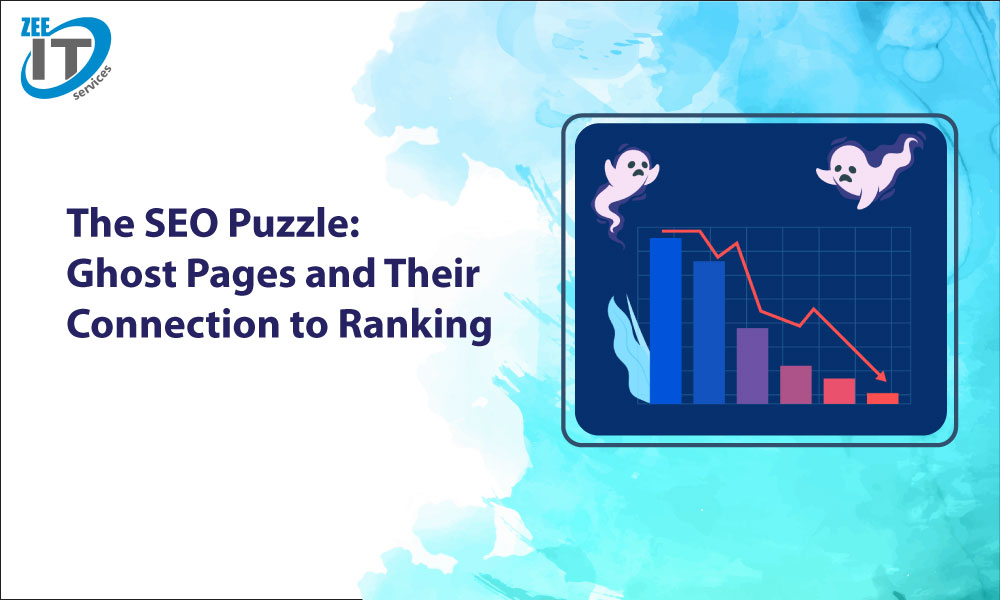
Nov 15, 2023 | Blogs
What Are Ghost Pages?
Ghost Pages, frequently hidden in mystery, are pages that exist within the framework of your website but remain unnoticed by search engine crawlers. These Invisible issues can undermine your SEO efforts by avoiding detection, thereby missing out on potential opportunities to boost your website’s visibility.
Consider having a page on your website that’s invisible to your visitors, but not to search engines. Ghost Page are like the invisible ink of the digital world, existing without being seen. They’re pages that are indexed by search engines but don’t show up when someone visits your site.
For example, if you design a fantastic product page, well crafted with compelling content, but no matter how hard you look, you can’t find it when you navigate your site. That shows that it might be a ghost page.
Different Types of Ghost Pages
Orphan Pages
Orphan pages, like lost souls in the digital abyss, exist without any internal or external links pointing to them. They are disconnected from the website’s structure, making it difficult for search engines to assign them a place in the hierarchy. Addressing orphan pages in SEO is crucial to maintaining a coherent and well-organized website architecture.
Duplicate Content Pages
Ghost pages can also manifest as duplicates, haunting the web with replicated content. Search engines strive to provide unique and valuable content to users; hence, encountering identical pages raises concerns about the site’s credibility. Resolving issues related to duplicate content is vital for a website’s SEO health.
Redirected Pages
Pages that have been redirected, often due to site restructuring or content updates, can become ghostly remnants of their former selves. While redirects are essential for user experience, mishandling them can lead to SEO issues. Ensuring that redirected pages seamlessly integrate into the website’s structure is crucial for maintaining search engine favour.
How Search Engines Perceive Ghost Pages?
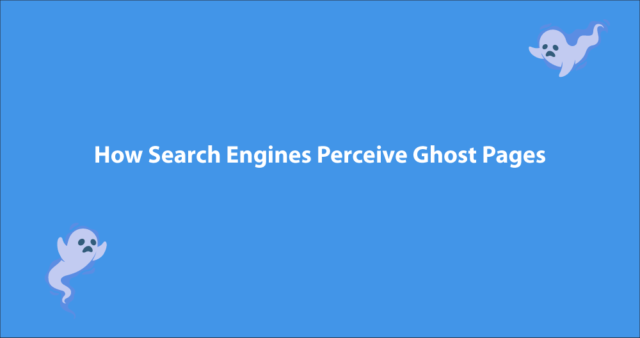
Search engines, the internet’s vast knowledge, rely on algorithms to index and rank web pages. Search engines, such as Google, perceive ghost pages as an enigma, a puzzle waiting to be solved. These pages frequently don’t have the same visibility as information that is well-linked, which begs the question of their relevancy and intent.
While invisible to users, these pages are not invisible to the algorithms, leading to a digital paradox. Additionally, search engines interpret Ghost Page as present and also absent, causing a state of confusion that complicates their understanding of the content on a website.
How Ghost Pages Affect Search Engine Crawlers?
Search engine crawlers, the digital spiders that tirelessly navigate the vast web, encounter ghost pages as Potential challenges in their journey. The absence of clear pathways to these pages leaves crawlers Puzzled, questioning their role in the grand scheme of the website. This confusion can hinder the overall indexing and ranking process.
Indexing Challenges with Ghost Pages
One of the primary challenges posed by ghost pages is related to website indexing issues. Search engines rely on an organized index to serve relevant results to users. While these pages may be indexed, their invisibility to users raises questions about the accuracy of search engine indexes and introduces an element of disorder that search algorithms find hard to recognize. It also affects the relevancy of search engine results when search engines struggle to differentiate between visible and invisible content.
SEO and ghost pages
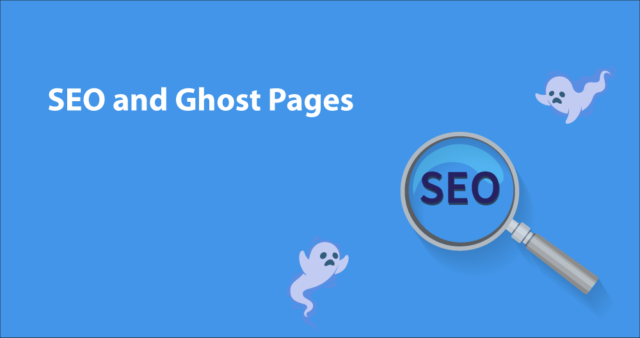
What Are Ghost Pages in SEO ?
SEO between websites and search engines takes an unexpected turn when Ghost Page make an appearance. Ghost Pages, in the context of SEO, refer to pages within a website that exist in its architecture but go unnoticed by search engine crawlers. These hidden entities can exert a subtle yet substantial impact on a website’s overall performance in search engine rankings.
The Significance of Ghost Pages in SEO
The significance of Ghost Pages lies in their ability to compromise the integrity of a website’s SEO strategy. Search engines, such as Google, prioritize relevance and user experience. Ghost Page provide a level of disturbance that can take attention away from the main content and lower the website’s ranking in search results since they cannot be visited by crawlers.
Imagine having a Ghost Page with outdated content. Search engines may still consider it relevant, affecting your site’s credibility and user satisfaction.
What are Ghost Links?
Now, let’s explore the strange world of Ghost Links as links play a crucial role in SEO. Ghost Links, in essence, are links that exist within a website’s structure but operate incognito and remain undetected by search engines. They may lead to pages that are not indexed or intentionally hidden. Understanding the nature of these invisible connections is crucial for mastering the intricacies of SEO. The question arises here: How do these Ghost Links impact SEO?
Indeed, ghost links have an indirect impact on SEO. When these invisible links connect to Ghost Pages, they contribute to the overall reduction of a website’s content relevance. As search engines analyse link structures and user engagement, the presence of Ghost Links can disrupt the seamless flow of information, impacting the website’s perceived authority.
How to Leverage Ghost Links for SEO Advantage?
To extract value from Ghost Links, consider implementing strategic redirects to channel traffic from these links to high-priority pages. Additionally, audit and optimize these links to align with your SEO strategy, ensuring they contribute positively to the overall user journey.
Common Causes of Ghost Pages

Unintended URL Variations
One prevalent cause of Ghost Pages stems from unintended URL variations, often introduced by URL parameters. These variations can create duplicate content issues, confusing search engine crawlers and diluting the relevance of your primary pages.
But how to Deal with URL Parameters to prevent ghost pages?
To tackle the risk of Ghost Pages appearing by URL parameters, implement proper handling mechanisms. Utilize tools like Google Search Console to specify parameters that should be ignored, preventing unnecessary indexing of variant URLs.
Addressing URL Canonicalization
URL canonicalization issues can contribute significantly to the manifestation of Ghost Pages. When search engines encounter multiple URLs pointing to similar content, it raises questions about the preferred version, leading to content dilution.
To address the URL Canonicalization use the Canonical Tags
To address URL canonicalization issues, leverage canonical tags. Clearly define the canonical version of a page, guiding search engines to prioritize it over its variants. This strategic implementation enhances the focus on core content, minimizing the risk of Ghost Pages.
Content Management System Issues
Content Management Systems (CMS) are powerful tools, but their dynamic nature can inadvertently generate Ghost Pages. These may arise from automated processes, such as pagination or category filters, creating additional URLs that go unnoticed.
How to Identify and Eliminate CMS-generated Ghost Pages
To combat CMS-generated Ghost Page, conduct regular audits. Scrutinize automated processes and ensure they align with SEO best practices. Implement measures like 301 redirects or canonical tags to consolidate authority and thwart the emergence of unintended pages.
Detecting Ghost Pages on Your Website:
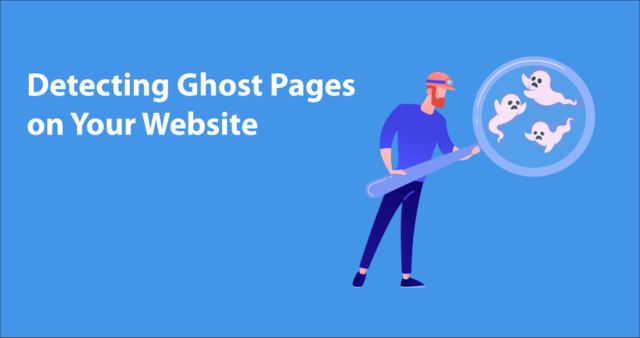
It is very important to detect and remove these ghost pages from your site to better maintain its ranking in search engine results. To identify and remove the ghost page we take different advanced techniques using SEO auditing tools and manual inspection. Let’s see how:
Utilizing SEO Auditing Tools
In the arsenal of a meticulous website administrator, SEO auditing tools stand as the first line of defence. These tools not only carefully examine the visible aspects but also penetrate the depths of your website to expose ghost pages lurking in the shadows. These tools included:
Google Search Console
Google Search Console, a stalwart in the realm of SEO, offers an intuitive platform for monitoring your website’s performance. Navigate to the ‘Coverage’ report to unveil any anomalies. Pay close attention to the ‘Excluded’ pages, as these could be potential ghost pages flying under the radar.
SEMrush
SEMrush, a powerhouse in SEO analytics, goes beyond the basics. Utilize the ‘Site Audit’ feature to identify pages with low organic traffic or those that are not indexed. These could be the elusive ghost pages plaguing your website.
Ahrefs
Ahrefs, renowned for its backlink analysis, also provides robust site auditing capabilities. Dive into the ‘Site Audit’ section, where issues like 404 errors or duplicate content may reveal the presence of ghost pages haunting your website.
Step-by-Step Guide to Identifying Ghost Pages
Conducting a Thorough Site Audit
Initiate a comprehensive Audit using your chosen SEO auditing tool. Look for pages with abnormal metrics, such as zero traffic or unusual redirects. These might be ghost page waiting to be uncovered.
Scrutinizing Meta Tags and Descriptions
Ghost pages often wrap themselves with inconspicuous meta tags. Scrutinize the meta information of each page, focusing on those with unexpected or irrelevant content. This meticulous analysis can unveil hidden pages playing ghostly tricks on your SEO.
Manual Inspection Techniques
Analyzing Site Architecture
- Hierarchical Review: Begin with a hierarchical review of your website’s architecture. Ghost pages may linger in forgotten corners. Look for anomalies in your sitemap, ensuring that every listed page serves a legitimate purpose. If a page seems out of place, it could be a ghost page haunting your website’s structure.
- Content Discrepancies: Ghost page often mimic existing content. Conduct a meticulous comparison of your website’s live content against its architecture. Any discrepancies could signal the presence of ghost page that need to be exorcised.
Examining Server Logs for Ghost Page Activity
- Log File Analysis: Your server logs are a goldmine of information. Dive into the log files to identify unusual patterns or requests. Ghost pages may leave limited hints in these logs, betraying their presence even when they remain hidden from traditional scrutiny.
- IP Address Anomalies: Ghost page may be accessed through unusual IP addresses. Analyse your server logs for IP addresses that deviate from the norm. This method can be a powerful manual tool for pinpointing ghost page that automated audits might miss.
Fixing Ghost Pages for Improved SEO
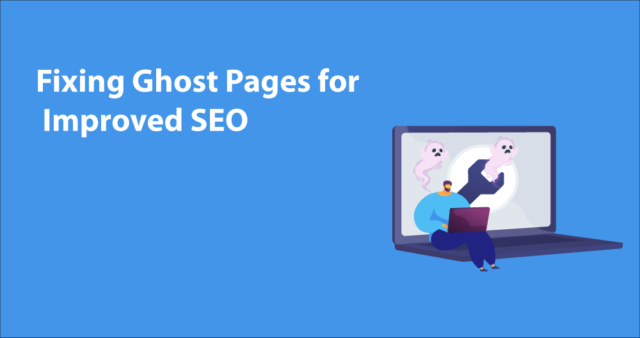
Implementing 301 Redirects
Redirect Strategies for Different Ghost Page Types
- Page Deletion Redirects: When eliminating a page due to outdated content or strategic changes, a 301 redirect is your ally. Ensure that users and search engines seamlessly transition to the most relevant content, preventing any negative impact on your SEO ranking.
- URL Restructuring Redirects: If you’re restructuring your website or altering URL formats, implement 301 redirects to guide both users and search engines to the updated pages. This strategy preserves valuable link equity and maintains a consistent user experience.
- HTTP to HTTPS Redirects: In the era of heightened security, migrating from HTTP to HTTPS is not just recommended—it’s imperative. Implementing a 301 redirect from HTTP to HTTPS ensures a secure and uninterrupted user journey, while search engines appreciate the enhanced security, positively impacting your SEO.
Best Practices for 301 Redirects
- Timely Implementation: Time is of the essence when dealing with ghost pages. Implement 301 redirects promptly to minimize any negative impact on user experience and SEO rankings. Delayed redirects can lead to user frustration and potential ranking penalties.
- Maintain Relevance: Redirecting users to relevant content is paramount. Craft redirects that align with the user’s intent and the thematic relevance of the original ghost page. This not only satisfies user expectations but also signals to search engines that your content is consistently valuable.
- Update Internal Links: Don’t forget to update internal links throughout your website. Ensure that all references to the redirected ghost pages now point to the new, relevant content. This internal coherence contributes to a seamless user experience and reinforces your site’s credibility.
Proper URL Canonicalization
Canonical Tags: How and When to Use Them
- Identifying Duplicate Content: Ghost pages often manifest as duplicates, diluting the effectiveness of your SEO efforts. Canonical tags come to the rescue by signalling to search engines which version of the page is the preferred or canonical one. Implement these tags judiciously to consolidate ranking signals.
- Dynamic URL Canonicalization: For websites with dynamic content, canonical tags provide a dynamic solution. Employ them to steer search engines toward the original, canonical version of a page, preventing the website indexing issues of multiple URLs with similar content. This strategic canonicalization strengthens your SEO foundation.
Resolving Duplicate Content Issues with Canonicalization
- Prioritize Canonical URLs: Clearly define canonical URLs for your pages, prioritizing the most relevant and authoritative version. This ensures that search engines focus on the preferred content, consolidating ranking signals and mitigating the impact of ghost pages on your SEO.
- Regular Audits and Updates: The digital landscape is dynamic, and so should be your approach to canonicalization. Conduct regular audits to identify any emerging duplicate content issues and promptly update canonical tags. This proactive approach safeguards your SEO against the spectral presence of ghost pages.
Why to choose Zee IT Services?
Elevate your online presence with Zee IT Services – your local SEO superheroes! Start your business visibility, outrank competitors, and dominate local searches effortlessly. Our tailored strategies ensure your brand shines in every local search query, bringing customers to your doorstep. Harness the power of local SEO with Zee IT Services – because being found locally is the first step to global success!
Frequently Asked Questions
What are ghost pages in terms of SEO, and how do they impact website ranking?
Ghost pages refer to web pages that are technically present but inaccessible to search engines. These pages can negatively impact your website’s ranking because search engines may interpret them as low-quality content or even penalize them for indexing issues. It’s crucial to identify and address ghost pages to ensure a healthy and optimized website structure.
How can I discover if my website has ghost pages affecting its SEO performance?
Conducting a thorough website SEO audit is the key to uncovering ghost pages. Utilize SEO tools to crawl your site and identify pages with issues like broken links, improper redirects, or blocked access. Analysing your website’s indexation status in search engine consoles can also reveal the presence of ghost pages that need attention.
Do all ghost pages have a negative impact on SEO, or are there exceptions?
While the majority of ghost pages are detrimental to SEO, there might be cases where certain pages are intentionally kept hidden from search engines, such as thank-you pages after form submissions. However, it’s crucial to properly manage and communicate with search engines about such exceptions to prevent any negative consequences on overall website ranking.
How can I efficiently remove or address ghost pages to improve SEO performance?
To tackle ghost pages, start by fixing any technical issues that prevent search engines from accessing these pages. Use proper redirects or update links to ensure accessibility. Regularly update your sitemap and robots.txt files, and communicate changes to search engine consoles. Additionally, monitoring your website’s performance post-correction is essential to track improvements in SEO ranking.
Are there preventive measures to avoid the creation of ghost pages in the first place?
Yes, proactive measures can prevent the emergence of ghost pages. Regularly update and review your website’s content management system (CMS) to ensure it aligns with SEO best practices. Implement proper redirects when restructuring your site, and use canonical tags to indicate preferred URLs. Conduct routine audits to catch and address potential issues before they escalate into ghost pages affecting your SEO performance.

Nov 14, 2023 | Blogs
SEO is the backbone of online visibility. It involves optimizing various components to rank higher on search engine result pages (SERPs). Keywords, backlinks, and meta tags play pivotal roles in achieving this visibility. While various factors contribute to a...

Oct 17, 2023 | Blogs
In the ever-evolving digital landscape, the battle for supremacy in search engine rankings rages on. SEO, or Search Engine Optimization, has become a crucial aspect of online success. The power of words and content cannot be underestimated when it comes to ranking on Google. As the competition intensifies, two contenders have emerged as front-runners in content creation: Artificial Intelligence (AI) and human writers. With advancements in artificial intelligence (AI), the lines between AI-generated content and human-written content are blurring. Especially, the introduction of ChatGPT and an extensive number of other artificial intelligence (AI) solutions has rapidly made AI-generated content the hot topic of the SEO industry. In this article, we delve deep into the world of SEO to unmask the strategies, strengths, and limitations of these rivals.
The Rise of AI Content
AI has made remarkable strides in content creation. With algorithms that can generate text, identify trends, and optimize for search engines, AI has become a powerful tool for businesses seeking to dominate the digital space. Automated content generation tools like Chatgpt and Google Bard have the ability to produce vast quantities of text quickly and efficiently, making them invaluable for large-scale content strategies. However, there are some limitations in AI-generated content that only humans can address.
The Art of Human-Crafted Content
On the other side of the battlefield, we find human writers. The art of crafting content through human ingenuity, creativity, and emotional depth is something that AI struggles to replicate. Human writers bring a unique, personal touch to their work, infusing it with authenticity, empathy, and the ability to connect with readers on a profound level.
What does Google say about AI text?
In September 2021, Google had not issued any official statements specifically regarding AI-generated text, nor had they provided an official stance on how AI-generated content would be treated in their search algorithms. However, Google’s approach to AI-generated content can be inferred from its general guidelines and policies. So what are the guidelines that comply with Google policy and guarantee E-A-T?
- Quality Matters: Google’s primary focus has always been on delivering high-quality content to its users. Regardless of whether content is generated by AI or humans, Google’s algorithms aim to reward content that is valuable, informative, and relevant to users.
- Originality: Google has consistently emphasized the importance of original content. AI-generated content should not be scraped or duplicated from other sources, and it should provide unique insights or perspectives to be considered valuable.
- User Experience: Google prioritizes the user experience. Content, whether created by AI or humans, should be user-friendly, easy to read, and free from errors. It should provide a positive experience for those who visit the page.
- Transparency: While not specifically addressing AI-generated content, Google has encouraged website owners to be transparent about their content creation processes. This means being clear about whether content is generated by AI or human authors.
- Avoiding Spammy Practices: Google’s guidelines prohibit spammy practices such as keyword stuffing, link schemes, and other tactics designed to manipulate search rankings. These guidelines apply to all content, including that generated by AI.
- Evaluation and Adaptation: Google’s algorithms continuously evolve to adapt to changing web content. They are designed to learn and improve over time, and this includes understanding and evaluating different types of content, including AI-generated text.
Can AI-generated content rank well?
AI-generated content can indeed rank well in search engine results when it meets certain criteria and ensures it is valuable, unique, and meets E-E-A-T standards. I see the number of websites that generate AI content and also ranking on Google. Google’s algorithms aim to provide the best and most relevant content to users, regardless of whether it’s generated by AI or created by humans.
Here are some key factors that can help AI-generated content rank well:
- Quality and Relevance
- Keyword Optimization
- Originality
- User Experience
- Value-Added Information
- Monitoring and Improvement
- Ethical and Legal Considerations
- Transparency
- Backlinks and Promotion
It’s important to note that Google’s algorithms are constantly evolving, and they aim to understand the quality and intent of content more effectively. As such, the quality of AI-generated content is crucial. While AI can assist in content creation, it often requires human oversight to ensure the final product meets these criteria and offers real value to users. Ultimately, the success of AI-generated content in rankings depends on how well it aligns with these principles and best practices.
AI vs. Human Writers: A Head-to-Head Comparison
The Power of Keywords: AI’s Precision vs. Human Creativity
AI excels at keyword optimization. It can analyze search trends and integrate keywords seamlessly into content. This precision ensures that AI-generated content aligns with the latest SEO best practices. However, it may sometimes lack the creative finesse that human writers provide. Human writers, with their innate ability to understand context and convey emotions, have the upper hand in crafting content that engages readers on a personal level. They can adapt content to fit the SEO requirements while maintaining a human touch.
Quality and Originality: Human Writers Take the Lead
AI content often lacks the nuances of originality and creativity. While AI can generate text, it cannot truly innovate or produce unique perspectives. In contrast, human writers can infuse their work with fresh ideas, unique insights, and a voice that distinguishes one piece of content from another.
The Role of Engagement: Can AI Connect Emotionally?
Engagement is a critical factor in SEO success. Human writers are adept at creating content that connects with readers emotionally. They can tell stories, elicit empathy, and build trust, which AI-generated content sometimes struggles to achieve. The emotional connection readers feel can lead to longer on-page time and higher conversion rates.
Adapting to Trends: AI’s Agility vs. Human Insight
AI excels at tracking and adapting to trends. It can quickly identify emerging keywords and topics, enabling content to stay relevant. Human writers rely on their experience and intuition to anticipate trends, which can sometimes lead to more profound insights but may lag behind AI in terms of agility.
Trust and Credibility: The Human Touch
In the era of fake news and misinformation, trust and credibility are paramount. Readers often trust content produced by humans more readily. Human writers are responsible for fact-checking, ensuring accuracy, and maintaining ethical standards in content creation.
SEO Strategy: Blending AI and Human Expertise
The battle between AI and human writers is not a zero-sum game. The key to SEO dominance lies in blending the strengths of both. Utilizing AI for comprehensive keyword research, data analysis, and content generation can save time and resources. Human writers can then step in to refine the content, infuse it with authenticity, and ensure it resonates with the target audience.
SEO Ethics: The Responsibility of Content Creators
SEO is not just about ranking higher; it’s also about ethical content creation. Both AI and human writers bear the responsibility of creating content that is accurate, informative, and respectful of user privacy. Transparency in content creation and SEO practices is critical.
Frequently Asked Questions
Can AI-generated content really compete with human-written content in SEO rankings?
AI-generated content has made significant strides in SEO, particularly in terms of efficiency and keyword optimization. However, the ability to compete depends on the quality, originality, and user engagement provided by AI, which can still be surpassed by human writers in certain contexts.
How can I ensure that AI-generated content maintains a human touch and emotional engagement?
To infuse AI-generated content with a human touch, consider using human editors or content writers to review and refine the content. Adding personal anecdotes, storytelling, and unique insights can help create a stronger emotional connection with readers.
Are there specific types of content where AI outperforms human writers in SEO?
AI excels in generating data-driven, technical, or repetitive content, such as product descriptions or stock market reports. In these cases, AI’s precision and efficiency can give it an edge in SEO. However, for content that requires creativity, deep expertise, or a personal touch, human writers often perform better.
What’s the future outlook for the relationship between AI and human writers in SEO strategy?
The future of SEO is likely to involve a synergistic relationship between AI and human writers. AI will continue to streamline processes, while human writers will focus on crafting authentic, engaging, and emotionally resonant content. A balanced approach will be key to SEO success.
How can I detect AI content on websites, and why is this important for SEO?
Detecting AI-generated content is not always straightforward, but there are tools and techniques that can help. It’s important for SEO because transparency and trust are vital for user experience and credibility. Users and search engines alike value content authenticity, which is closely tied to SEO success.
Page 4 of 19« First«...23456...10...»Last »

